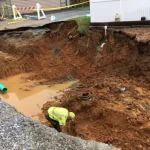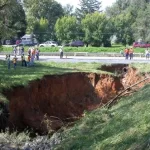Geotechnical engineering is a branch within civil engineering which deals with earth materials and their impact on various projects. The main focus of this field is the examination of the various soil and rock strata on a site, the determination of their key engineering properties, and the evaluation of what impacts the subsurface conditions may pose of the project at hand. The ground is the building block upon which every project is supported; thus, geotechnical engineering is involved in every project. The degree of investigation, impacts of the soil, and the overall need for a subsurface investigation vary greatly depending on the type of project.

Some of the main issues that can be encountered on a site include the following:
• Expansive/collapsible soils
• Shallow ground water
• Fill/contaminated soils
• Shallow/variable bedrock depths
• Soft, compressible soils

Each of the above issues has its own distinct concerns that can impact a project. Things like shallow ground water or shallow bedrock can become a constructability issue and if these conditions are not known can lead to significant increases in the construction cost and delays in the construction schedule. Other issues dealing directly with the soil such as expansive/collapsible soils, presence of fill/contaminated soils, or soft compressible soils can impact the overall performance of the structure if it has not been properly designed. Most structures are able to handle approximately ¾-inch of movement without experiencing noticeable distress and the geotechnical engineers job is to help you design a foundation which accounts for the subsurface conditions and the specific parameters associated with your project.

The overall evaluation of a site has three distinct phases. The first is the investigation which is comprised of a preliminary site assessment to evaluate what soils are likely present followed by a field investigation using either borings to test pits to obtain samples and document in-situ conditions. Following the field investigation, the samples are sent to the laboratory for testing to help confirm field classifications and determine the appropriate engineering properties needed by the engineer to complete the evaluation of the site. Following the laboratory investigation, the engineer analyzes the subsurface data collected and the project parameters to provide recommendations which are suitable for the project and the site conditions.
While the majority of the geotechnical work is performed up front during the planning stages of a project, the involvement of the geotechnical engineering staff is critical through the entire project. Often during design and construction, changes in the design or unforeseen conditions on site arise which require further evaluation. Our staff is available to assist with all geotechnical aspects of your project from the initial investigation all the way through to the completion of construction to help ensure that the projects will be successful, safe, and accounts for the subsurface conditions across the site.
TD&H employs geotechnical engineers with experience in a wide range of geotechnical disciplines including foundation design (shallow and deep foundations), evaluation of expansive soils, slope stability assessment/monitoring, roadway/pavement design, and water resources projects including canals, dams, and other earthen structures. Be sure to contact TD&H Engineering at 761-3010 to discuss the geotechnical aspects of your upcoming project and how we can help.


